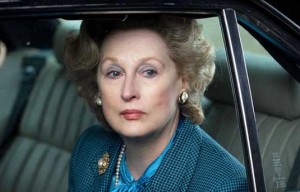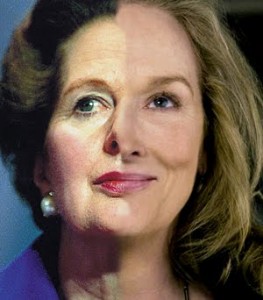Who wants to see a movie about Margaret Thatcher? The Weinstein Company will find out today, as The Iron Lady goes into wide release. My guess is that an audience that shrugged at Harvey Weinstein’s other Oscar-baiting bioportrait, My Week with Marilyn (for good reason; it’s awful) will also roll its eyes at this one. There are some historical figures best left to biographers and documentarians, and based on the evidence of The Iron Lady Thatcher is one of them. But I could be wrong. There’s always the Meryl Streep factor to consider.
Streep is the latest-arriving of movie stars. Active in cinema since 1977, the actress’ actress (a record 16 Oscar nominations, two wins) didn’t arrive as a crowdpleaser until The Devil Wears Prada in 2006, when she was 57, and it’s been gravy ever since, with name-above-the-title hits that peers like Glenn Close and Jessica Lange can only dream about: Mamma Mia! (2008), her first collaboration with Iron Lady director Phyllida Lloyd, and a summer and Christmas season twofer in 2009, Julie & Julia and It’s Complicated. And it was complicated: the groundwork was laid 20-plus years earlier by directors like Mike Nichols (1986’s Heartburn and 1990’s Postcards from the Edge), Albert Brooks (1991’s Defending Your Life), and Robert Zemeckis (1992’s Death Becomes Her), who got her out of the accents and frippery of her storied beginning and made her lighter and more approachable. Eventually, at an age when most actresses are resigned to playing Kristen Stewart’s great-grandmother or otherwise struggling for visibility on the big screen, audiences warmed to her.
 We’re so in love with her we’re practically nostalgic for the old days when she intimidated the hell out of us, and as its title suggests The Iron Lady is retro Streep, the full Meryl, like we’ve rarely seen her since the 80s. A comparison with My Week with Marilyn is instructive. In that film Michelle Williams, a strong actress but no love goddess in looks, plays the charm and vulnerability of the icon, and gets away with it–until the scene where Laurence Olivier (Kenneth Branagh, uninspired), watching rushes of the movie they’re trying to get through, sees that the enchantment she radiates onscreen makes the difficulties they’re having offscreen all worthwhile. We don’t–Williams-as-Monroe lacks the appeal of the real thing, and the illusion fades away. None of that for Streep. If she’s playing Margaret Thatcher, she’s going to give us Margaret Thatcher, by God, and that means wigs and teeth and padding and handbags and pearls and an accent to frighten the horses. She’s like Lon Chaney playing The Hunchback of Notre Dame up there, and no one dares question an American’s credentials for the role.
We’re so in love with her we’re practically nostalgic for the old days when she intimidated the hell out of us, and as its title suggests The Iron Lady is retro Streep, the full Meryl, like we’ve rarely seen her since the 80s. A comparison with My Week with Marilyn is instructive. In that film Michelle Williams, a strong actress but no love goddess in looks, plays the charm and vulnerability of the icon, and gets away with it–until the scene where Laurence Olivier (Kenneth Branagh, uninspired), watching rushes of the movie they’re trying to get through, sees that the enchantment she radiates onscreen makes the difficulties they’re having offscreen all worthwhile. We don’t–Williams-as-Monroe lacks the appeal of the real thing, and the illusion fades away. None of that for Streep. If she’s playing Margaret Thatcher, she’s going to give us Margaret Thatcher, by God, and that means wigs and teeth and padding and handbags and pearls and an accent to frighten the horses. She’s like Lon Chaney playing The Hunchback of Notre Dame up there, and no one dares question an American’s credentials for the role.
But what Margaret Thatcher is she giving us? She and Lloyd and screenwriter Abi Morgan (Shame), good liberals all I think, are very calculating about this. The movie’s first scene is its best one, as a befuddled old lady, perplexed after a day of shopping, returns home to argue with her husband–who, we realize as another character intervenes, is recently deceased. Our hands clap our foreheads: Why, if it isn’t Margaret Thatcher, once the most powerful woman on Earth! It’s kind of silly–surely the immigrants in the shop, purposely shown to be a different clientele from when she was a grocer’s daughter, would recognize her–and kind of tasteless, too, yet it’s an effective frame on which to hang a biopic. Streep is at her best here, bantering with and yelling at Denis (Jim Broadbent, essentially reprising his Oscar-winning role in Iris, this time from the great beyond), who keeps dragging her into a past she only half-remembers in her dotage.
 The filmmakers only half-remember it, too. Thatcher was, and is, an incredibly polarizing figure; when I lived in Hong Kong in the late 80s a mere mention of her name to my British friends could trigger a blazing row, as they say. That’s pretty much sidelined in the movie, which views her in conventional “strong woman” terms, getting things done despite constant male opposition, always that headstrong grocer’s daughter from her first campaign to her place on the world stage. Writing about the film in The Wall Street Journal Peggy Noonan was misty-eyed with admiration at its admiration, which is unburdened by politics. The miners’ strike, the hunger strikes, the IRA–these are all buttoned up in quick montages, a stream of documentary-ish footage underscored by howls of outrage. The one controversy that the movie does spend time on is the Falklands war, which lets Streep, far less distinctive in the movie’s past, where’s she pretty standard and biopicky, than in its addled present, push little ships on table-sized maps and show the guys who’s boss, again.
The filmmakers only half-remember it, too. Thatcher was, and is, an incredibly polarizing figure; when I lived in Hong Kong in the late 80s a mere mention of her name to my British friends could trigger a blazing row, as they say. That’s pretty much sidelined in the movie, which views her in conventional “strong woman” terms, getting things done despite constant male opposition, always that headstrong grocer’s daughter from her first campaign to her place on the world stage. Writing about the film in The Wall Street Journal Peggy Noonan was misty-eyed with admiration at its admiration, which is unburdened by politics. The miners’ strike, the hunger strikes, the IRA–these are all buttoned up in quick montages, a stream of documentary-ish footage underscored by howls of outrage. The one controversy that the movie does spend time on is the Falklands war, which lets Streep, far less distinctive in the movie’s past, where’s she pretty standard and biopicky, than in its addled present, push little ships on table-sized maps and show the guys who’s boss, again.
(I have a theory on the Falklands. Last month I watched a Roger Moore movie called ffolkes, where his title character, a misogynistic diver, has to take a wavering female prime minister in hand to defuse a hijacking crisis involving North Sea oil rigs. That was in 1980, when Thatcher was still settling into 10 Downing Street. In the next year’s Bond film For Your Eyes Only, Thatcher and her husband are both caricatured as ninnies, something the series usually shied away from. So it was really Roger Moore who goaded her into the 1982 Falklands episode.)
Concentrating on Thatcher (there aren’t many other people in the movie, other than a two-line bit from Richard E. Grant as her usurper and a bunch of stuffed shirts usually encountered on Downton Abbey), Thatcherism, and its effect on England, are left on the cutting room floor. Mustn’t upset the paying customers. And that’s regrettable, as Lloyd, in better command of the medium than she was with Mamma Mia!, is a challenging stage director, whose recent adaptation Mary Stuart, the story of two strong women, is an outstanding political play. (The ABBA show, which I like, too, is an odd man out on her resume.) If she and Morgan have an opinion on Thatcher, they’ve kept it to themselves, which obliges Streep to act and act and act some more in a vacuum of ideas and sensibility. Anyone who wants to see a movie that really grapples with Margaret Thatcher is bound to leave this one frustrated.





Comments